Sean Russell
Books: Fantasy
The Initiate Brother (1991) and Gatherer of Clouds (1992)
Moontide and Magic Rise: World Without End (1994) Sea Without a Shore (1996)
The River into Darkness: Beneath the Vaulted Hills (1997), The Compass of the Soul (1999)
The Swans War: The One Kingdom (2001), The Isle of Battle (2002), The Shadow Roads (2004)
The Initiate Brother (1991) Gatherer of Clouds (1992)
 I love to re-read books. There is something about recapturing the joy they gave me the first time, that allows me to pick up some books again and again. But sometimes, time passes, and other books are read, until all that remains is the memory of enjoyment–when I go back to read a book, an occasional passage is familiar, but for the most part it is as if I am reading the book for the first time.
I love to re-read books. There is something about recapturing the joy they gave me the first time, that allows me to pick up some books again and again. But sometimes, time passes, and other books are read, until all that remains is the memory of enjoyment–when I go back to read a book, an occasional passage is familiar, but for the most part it is as if I am reading the book for the first time.
And that is an even bigger joy.
So it was with The Initiate Brother & Gatherer of Clouds. I read them for the first time in 1994, and although I loved them, for some reason I never got around to re-reading them.
I wonder whether if I wait another ten years to read them again, it will once more be like reading them for the first time?
These books are set in a fantasy Orient–a setting that I have to admit that I have a weakness for–and I love the details. But even more than the details I love the story. A young religious initiate making his way in the world, and despite his age, becoming advisor to a great Lord. It's got religious intrigue, political intrigue and even a tiny bit of romance.
 This book, like many others I love, seems to be fantasy only because it is set in a world that isn't quite ours, although in many respects it may as well be. There are no magicians or elves or faerie and even the mystical creature that eventually appears appeals more to my love of science than my love of fantasy.
This book, like many others I love, seems to be fantasy only because it is set in a world that isn't quite ours, although in many respects it may as well be. There are no magicians or elves or faerie and even the mystical creature that eventually appears appeals more to my love of science than my love of fantasy.
But even more than that it is his characters that are so wonderful, and their interactions remind me of what is real rather than what is ideal. There are countless stories where mortal enemies become allies and then friends as a result of a single event. More rare are the stories that strike me as far more true. Where feelings change in much the way a plant grows–slowly with little noticeable change from day to day. There is no sudden change of heart, only the slow changes that come with time, like falling out of love.
It is always difficult for me to write about books I love–for I want to describe the feeling the book gave me more than the story. Giving as few details as possible, so that someone else taking my recommendation would discover all the joy and details just as I did, with none of the secrets given away. This is why I tend to pick up books by author or my recommendation–I hate reading the blurbs on the backs of books. I want to enter the authors world knowing nothing, and learn facts as the author gives them, rather than getting the plot from a two paragraph synopsis.
So rather than burden you with details, I leave you instead with the recommendation to find this book and read it for the joy of discovery you'll find when you do.
The Initiate Brother cover by Michael Whelan
Gatherer of Clouds cover by Peter Goodfellow
Publisher: DAW
January 2005 | Rating: 9/10
World Without End (1994)
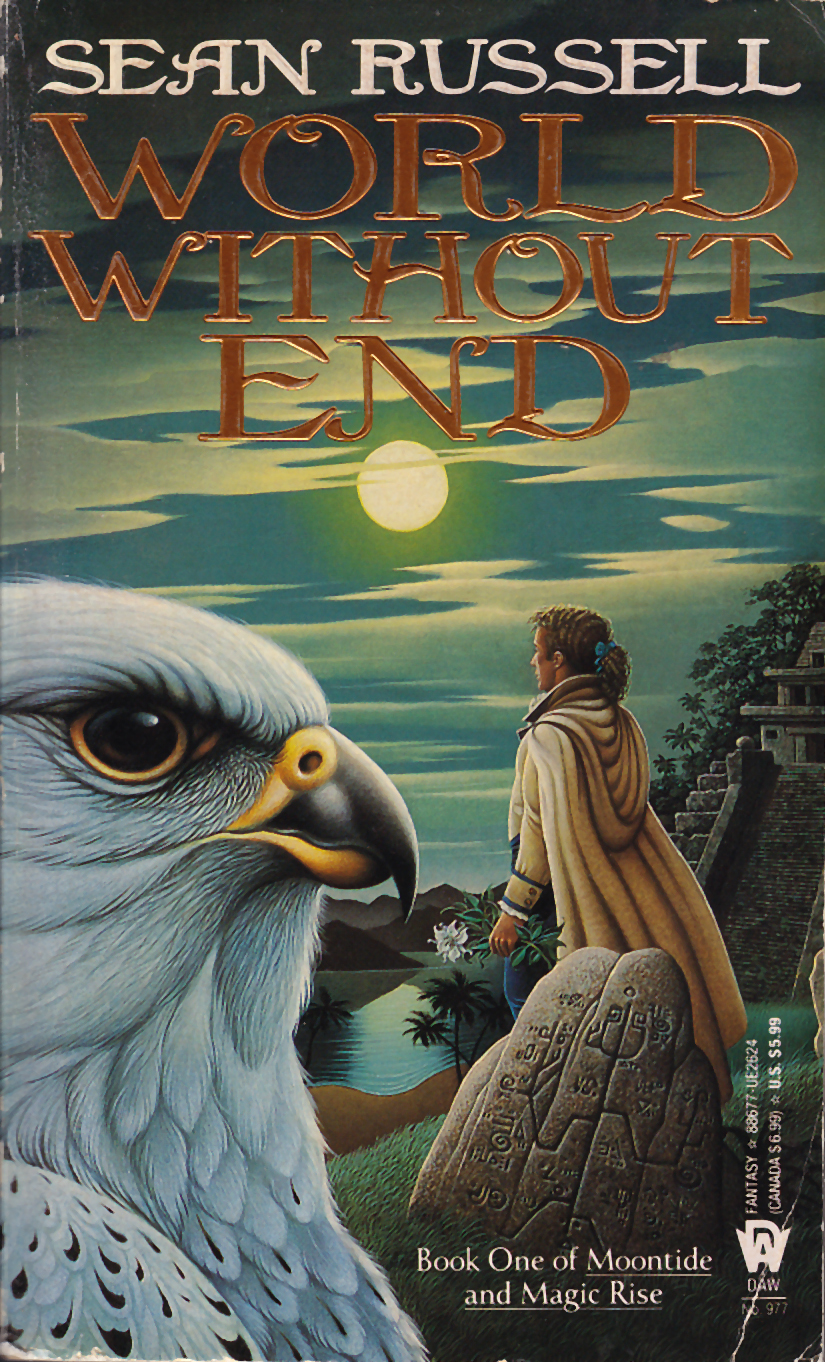 Reading "The River Into Darkness" series made me want to read another series written by Sean Russell, so I picked up the ""Moontide and Magic Rise" series, for which "The River Into Darkness" is the prequel. I was surprised to discover that I found this series much easier to follow after having just read its prequel. That isn't to say that I didn't enjoy this series when I read it before, only that the events of "The River Into Darkness" helped make the events in this book more clear.
Reading "The River Into Darkness" series made me want to read another series written by Sean Russell, so I picked up the ""Moontide and Magic Rise" series, for which "The River Into Darkness" is the prequel. I was surprised to discover that I found this series much easier to follow after having just read its prequel. That isn't to say that I didn't enjoy this series when I read it before, only that the events of "The River Into Darkness" helped make the events in this book more clear.
Tristam Flattery, a young naturalist, is the nephew and heir of Erasmus Flattery. Many believed that Erasmus had magical powers, and as the heir to Erasmus, many believe that Tristam himself may have magical powers, and that rumor has often set Tristam apart from others, although his cousin Jamis has been his lifelong friend and ally.
Tristam is called to the capital, to the King's arboretum, by the King's Man, to attempt to solve the botanical mystery of a plant that is supposed to support the health and long life of the king--a king who has lived for more than a century. This seemingly small task will lead Tristam on a voyage around the world.
This story has a variety of elements: Patrick O'Brien's "Master and Commander" series comes first to mind. Tristam himself reminds me a bit--as I believe he is supposed to--of Charles Darwin, especially with the long sea voyage and the botany and empiricism.
Although Tristam is one of the main characters, there are a variety of other characters who played a major role, starting with Jamis, but including Averil Kent, Alissa Sommers, and the Duchess of Morland. I particularly liked Avriel Kent's character. He is by his own estimation an old man, and he has no powers other than his ability as a painter, and his intellect and curiosity. He suffers from the limitations brought about by his age, however, his lack of physical prowess does not keep him from involvement in the political intrigue. I found this very refreshing.
As with his other books, World Without End tells and long and winding story. Tristam travels the world and meets many strange people. As with Sean Russells other stories, this is not a quick read, and to be honest I found parts of it somewhat confusing the first time I read the book. However, a slower second reading, combined with a greater understanding from the prequel, made things much more clear this time, and even more enjoyable.
Do not pick up this series if you are looking for a light read to take up a couple hours. Even I took some time to read these books. However, I found my patience greatly rewarded with interesting characters and a fascinating story.
Cover by Braldt Bralds
Publisher: DAW
- May 2005 | Rating: 8/10
June 2007 | Rating: 8/10
Sea Without a Shore (1996)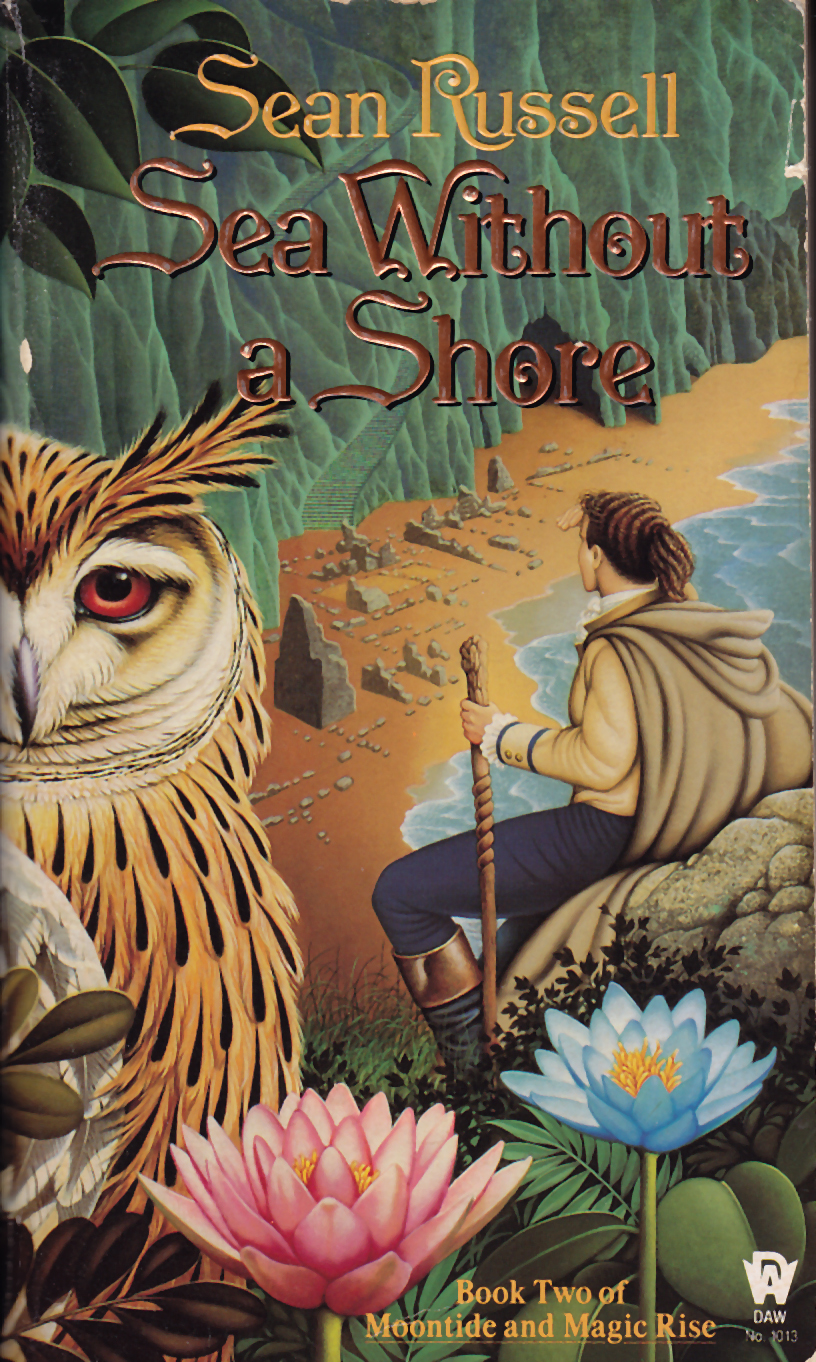
Sea Without a Shore takes up immediately after the close of World Without End. Tristam is recovering from the events on the Lost Island, Averil Kent is further embroiled in politics and working with the Countess of Chilton to keep Palle and his followers from creating a mage and returning magic to the world, and Jamis and Alissa have also become involved in Kent's efforts.
Again, I particularly enjoyed the character of Averil Kent. Usually, in fantasy usually the only old men we see are dying kings or wily magicians, it was nice to have a main character who was allowed to be old without having his age be the central point of his existence.
I also enjoyed the development of the character of Lady Chilton. She is very much a mystery, but like Averil Kent develops throughout the story, and I enjoy that development.
Although Tristam is supposed to be the primary character, I found that I often enjoyed reading about Jamis more than Tristam. Part of it may have been Tristam's relationships with the Duchess of Morland as opposed to Jamis's relationship with Alissa. The relationships between Jamis and Alissa simply felt more real to me, despite its ups and downs.
In addition the very satisfying character development, I also liked the resolution of the story. Although there is not a happily ever after for everyone, I found the conclusion very satisfying. Tristam's future is in many ways unknown, but his future is his own, and under his own control.
And there was, of course, the writing. As with Guy Gavriel Kay and Ellen Kushner, I find something very satisfying about Sean Russell's writing. Take this passage about Averil Kent.
Forty Years. Kent had spent so much time in this garden that he believed he knew its every stone, every branch on each tree. Yet it was a garden, and each season it came forth from the earth, like magic, almost mockingly familiar, but never twice the same. An ever-changing canvas, no single day ever to be repeated. One could plan a garden in infinite detail, but what blossomed forth from the earth was only an approximation of the vision. And in this way, too, it was like a painting, or like a man's life, for that matter. One could never predict what the magic of the earth would produce.
As a gardener myself, how can I not love that passage?
If you read the previous book, then you will of course want to read Sea Without a Shore. It is an immensely satisfying conclusion to the series.
Cover by Braldt Bralds
Publisher: DAW
- May 2005 | Rating: 8/10
June 2007 | Rating: 8/10
Beneath the Vaulted Hills (1997)
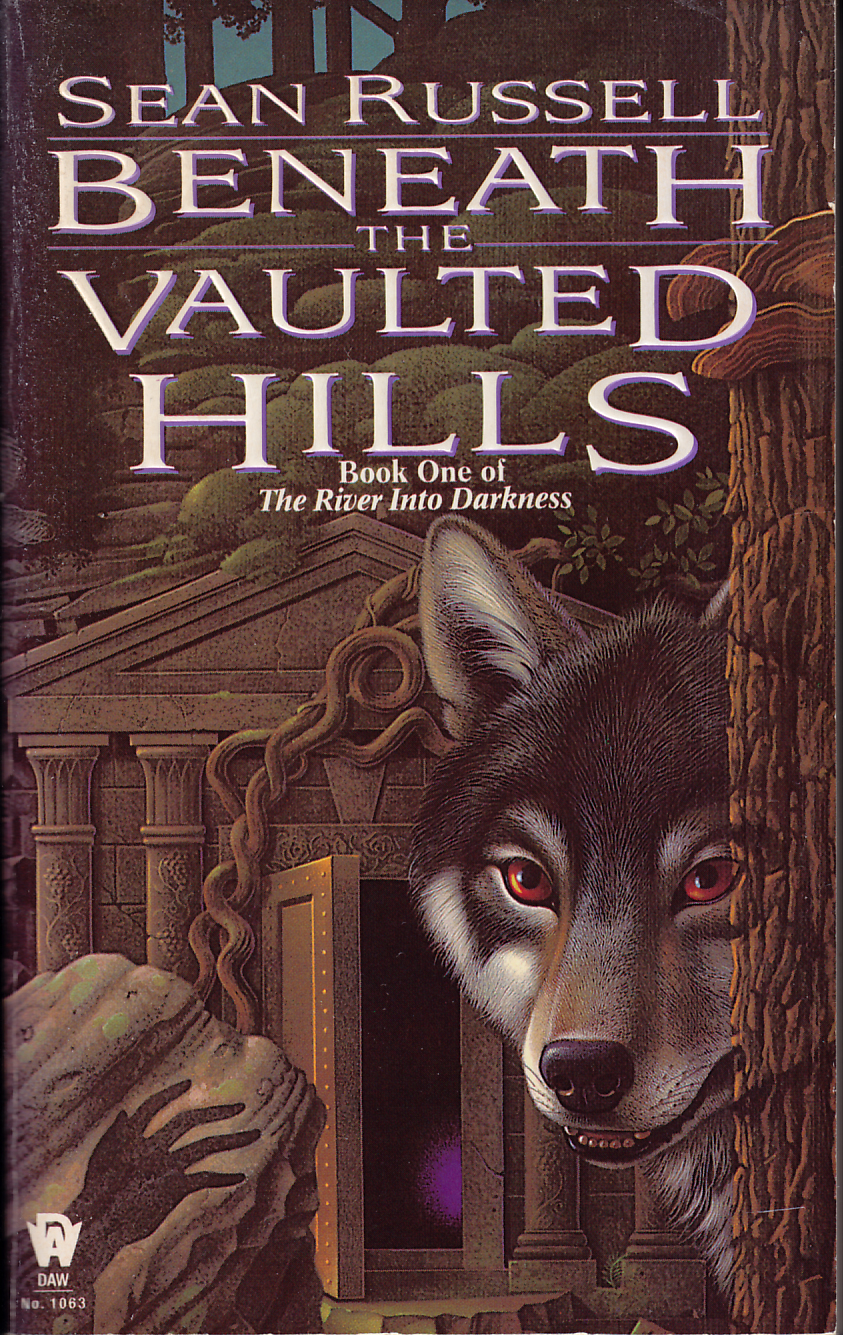 I've always been fond of Sean Russell's books. They're dense and complex, and I often understand them better on the second reading. But they're also beautifully crafted works full of marvelous characters. Unfortunately, Sean Russell has not published many books. Nine fantasy novels I believe (three duologies and a trilogy) plus two mysteries co-written under the name of T.F. Banks.
I've always been fond of Sean Russell's books. They're dense and complex, and I often understand them better on the second reading. But they're also beautifully crafted works full of marvelous characters. Unfortunately, Sean Russell has not published many books. Nine fantasy novels I believe (three duologies and a trilogy) plus two mysteries co-written under the name of T.F. Banks.
Because he publishes books so infrequently, I will actually hold onto his books--even for years--before reading them. After all, you can only once read a book for the first time. So I have actually had Sean Russell's "River Into Darkness" duology sitting on my shelves for years. Set aside for awhile, then forgotten for awhile till I was no longer sure whether I had read the books or not.
I hadn't.
It is, perhaps, less than true to say it all began in a brother, but I found Samual Hayes hiding in such an establishment and this marked the turning point if not an actual beginning. How Samual Hayes became misfortune's whipping boy, I will never understand.
Eldrich is the last mage, and Erasmus Flattery spent several years as a child living in Eldrich's house and being tutored by his servant, Walky. Now Erasmus is a grown man, haunted by his past. Despite this--or perhaps because of this--when Samual Hayes requests help, Erasmus helps him.
The Countess of Chilton is the most beautiful woman of her generation--a beauty that leads men who barely know her to duels. Yet she years for Lord Skye--the one many who seems to have no interest in her at all.
And then there is, of course, Eldrich the mage, whose life and motives are hidden to all and understood by none.
As Erasmus and Hayes attempt to discover why Hayes is being hunted by Navy men, they learn of the Stranger of Compton Heath, and discover that they are not the only ones interested in this mystery.
Like Sean Russell's other books, the story is complex and wide ranging, and almost as much of a mystery as a fantasy. Who was the Stranger of Compton Heath? Why was he taken away? Where did he come from? Why has interest in this Stranger lead to so much difficulty for so many people?
One of the things I enjoyed most about this story (and also about his "Moontide and Magic Rise" duology) is the setting. The feel is of Regency or Victorian England--science is starting to overcome magic, not only because Eldrich is the last mage, but because the population believes in science as something they can understand, while magic has always been the realm of a select few.
If you enjoy Guy Gavriel Kay, Ellen Kushner, and Lian Hearn, then you may enjoy Sean Russell. Although I didn't like "Beneath the Vaulted Hills" quite as much as I loved The Initiate Brother or "Moontide and Magic Rise" it is still very good, and well worth reading.
Cover by Robert Giusti
Publisher: DAW
June 2007 | Rating: 7/10
The Compass of the Soul (1999)
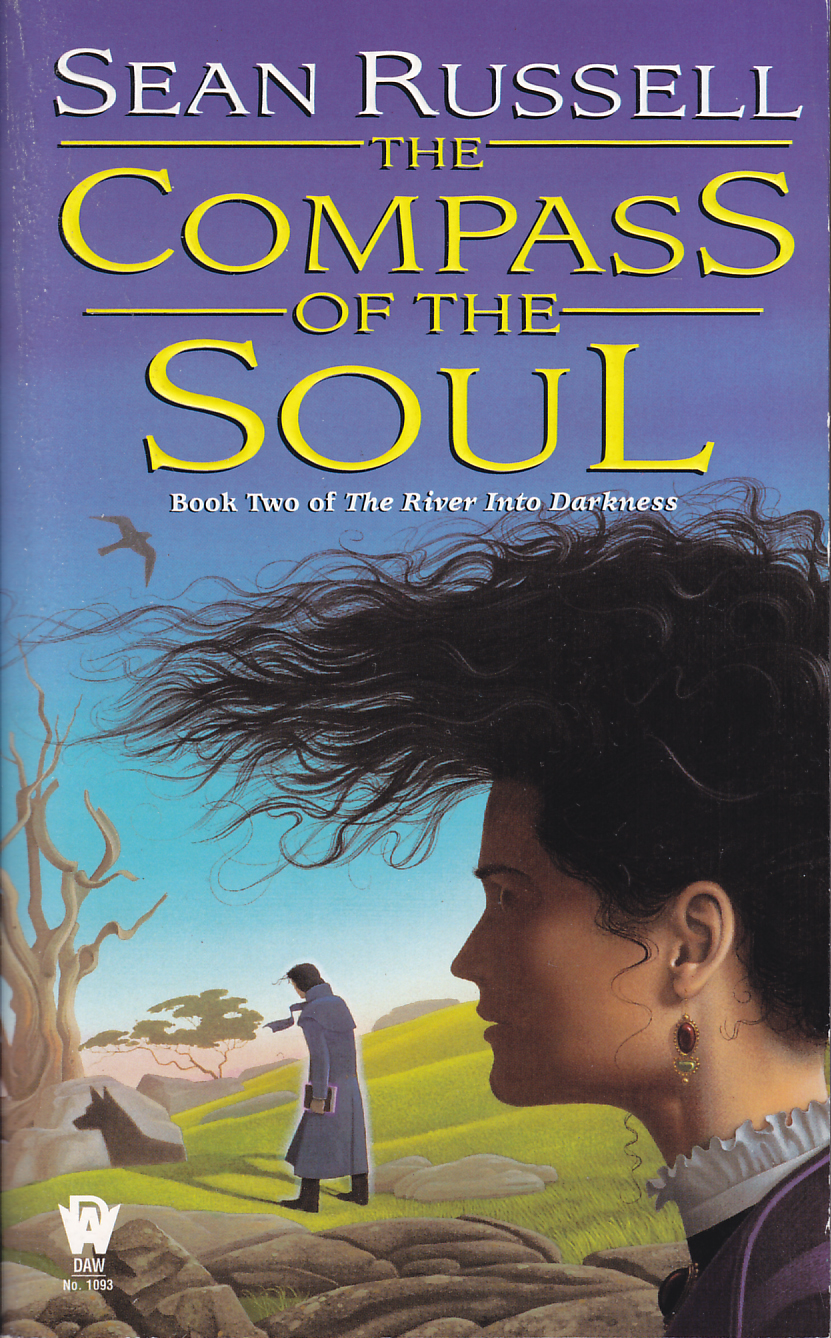 The sequel (and conclusion) to Beneath the Vaulted Hills, The Compass of the Soul continues the story of Erasmus Flattery, Countess Chilton, Anna Fielding, Lord Eldrich, and those who have gathered around them in the struggle for the fate of magic.
The sequel (and conclusion) to Beneath the Vaulted Hills, The Compass of the Soul continues the story of Erasmus Flattery, Countess Chilton, Anna Fielding, Lord Eldrich, and those who have gathered around them in the struggle for the fate of magic.
As with the previous book, the supporting characters were one of the strengths of the book. We continue to learn not just about Erasmus, but also about Anna and Randall as the story progresses. And in this book we finally begin to learn of Eldrich--what he has become and perhaps a small explanation as to why he is the way he is. he also--somehow--manages to become slightly more human. Not necessarily likable, but as we learn why he acts the way he does, we gain a sense of understanding, and why Walky has remained with him for so long.
I particularly enjoyed learning more about the secondary characters--Randall, Avril Kent, and others. I thought it interesting that Eldrich treated those with whom he dealt slightly differently. Not just the countess, but Kent and Randall. He still comes across as a cold heartless bastard, but there is an ever so slight difference in his reactions to different individuals.
In addition to concluding the adventure (and it the activities of Erasmus, Randall, and their group are definitely an adventure) we finally learn about the Stranger of Compton Heath, some of the past of Eldrich, and more about magic and why Eldrich and those who came before him believed that magic had to be erased from the world.
My biggest negative about this book is I absolutely hate the cover. As much as I love Sean Russell's writing, I was reluctant to pick up this book, because the cover made it seems like a completely different kind of book. Mostly the hair of the woman (?) on the cover. She looks like she belongs in an 90s music video rather than a Victorian world.
If you have read Beneath the Vaulted Hills then you don't need me to tell you that you'll want to read The Compass of the Soul. Although there were some conclusions in the first book, much was left hanging and unexplained that is resolved in this book. Although I enjoyed both of these books, I can't say they are my favorite Sean Russell books, and I would recommend that someone who has not read any of his books before read The Initiate Brother and Gatherer of Clouds first, and then Moontide and Magic Rise, to which this series is a prequel. But that may well just be my personal preference.
Cover by Robert Giusti
Publisher: DAW
June 2007 | Rating: 8/10
The Swans War
The One Kingdom (2001)
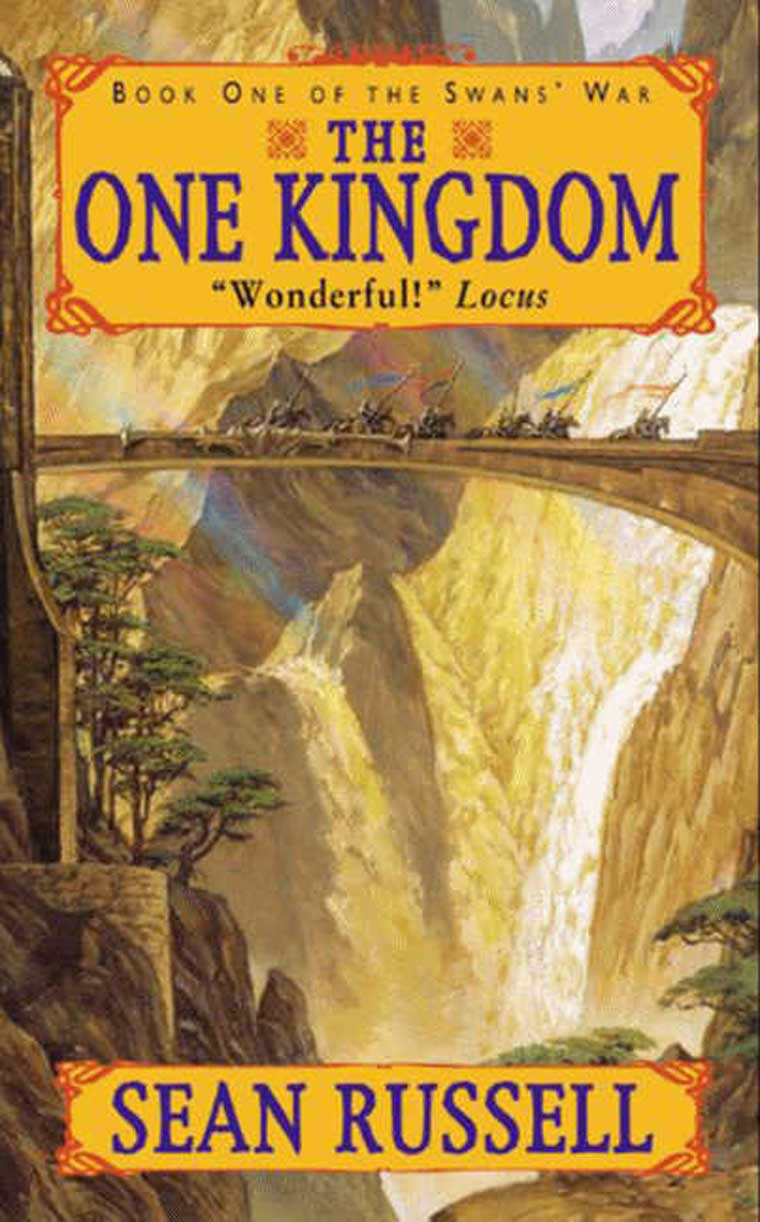 I love Sean Russell's writing. I've read everything he's written that I could get my hands on, including the mystery series he co-wrote as T.F. Banks. The One Kingdom and the other books he has written are very different from the supernatural fantasy that I most often scarf down. Sean Russell books take time. They're more to be savored than zipped through at the fast clip I normally read at.
I love Sean Russell's writing. I've read everything he's written that I could get my hands on, including the mystery series he co-wrote as T.F. Banks. The One Kingdom and the other books he has written are very different from the supernatural fantasy that I most often scarf down. Sean Russell books take time. They're more to be savored than zipped through at the fast clip I normally read at.
Tam and Baore and Fynnol are young men who have lived their lives in the Vale, near Telanon Bridge, in the Wilderness, far from any towns or cities. After spending years searching for ancient artifacts, they decide to travel the river to sell their artifacts and purchase fine horses–just the adventure for young men not quite ready to settle down. However, all their plans are set awry when a man named Alann comes to share their fire one night.
Elise Wills has lead a pampered life, but her Uncle is forcing that to change–forcing a marriage upon her for political alliances that are deep and confusing beyond the ken of a woman who has preferred to spend her time with her blind musician father, rather than at the balls and soires attended by her peers. Her life is also changed by by strangers, but the path she must follow is far harder than the path followed by Tam and his cousins, for as a woman she has little control over her life and her destiny.
The Renee and the Wills have hated each other for centuries, over a fight all but lost to the mists of time. Each keeps hope for the day when they may regain the crown and the throne and the kingdom–regardless of how impossible that idea and that dream may be.
What I particularly love about Sean Russell's writing is that although there are many characters in this book, we spend plenty of time getting to know the characters in the different groups, and when the story moves from group to group, it does so at an easy pace, allowing the story to unfold slowly.
However, this book has some flaws that do bother me. The ending is extremely frustrating for one. Almost nothing is resolved, and we are left wondering as to the fate of many characters. I really dislike it when authors do that. The other thing is that for once Sean Russell has written a trilogy instead of a duology. There's nothing wrong with trilogies, I just tend to prefer stand alone books and shorter series is all.
And this of course is not a problem for most people. Simply a pet peeve of mine.
If you are in the mood for a slowly unwinding story that takes you down a winding river, then you may want to sit back, put your feet up, and relax with Sean Russell.
Cover by Stephen Hickman
Publisher: DAW
August 2008 | Rating: 8/10
The Isle of Battle (2002)
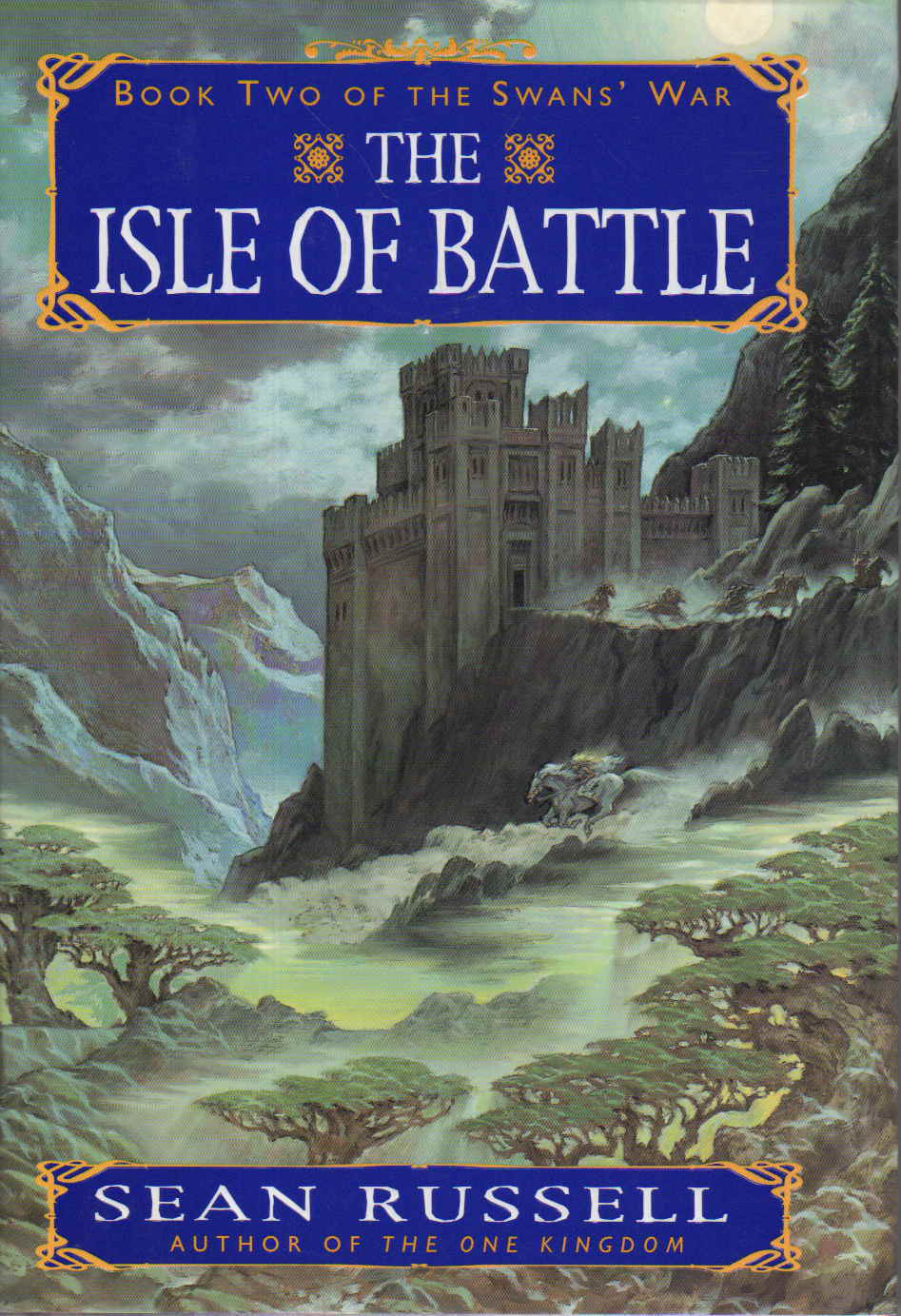 The Isle of Battle is good book. However, it is a middle book in a series; although the tale continues forward, the book doesn't have the momentum of the first book. The characters are still good, the intrigue is still good, but the characters spend much of the book wandering lost in the hidden lands, and at times the story felt like it too was lost in those same lands.
The Isle of Battle is good book. However, it is a middle book in a series; although the tale continues forward, the book doesn't have the momentum of the first book. The characters are still good, the intrigue is still good, but the characters spend much of the book wandering lost in the hidden lands, and at times the story felt like it too was lost in those same lands.
Additionally, unlike other Sean Russell books, this story moves from one incomplete ending to another. We pick up the pieces of the first book, but by the time we reach the end of the second book, those pieces are again scattered to the wind.
Yes, this is a personal peeve. I simply don't like books where we almost none of the story arcs are closed at the end of the story. And I think what bothers me most about this book is that this is a very unusual thing for Sean Russell to do.
Yes, this book is crafted well as are all his books, but I had the feeling this wasn't a true trilogy, but was instead a duology that got too big for its britches, and so three books were created from the two, and the middle book had to make up for it.
Perhaps I'm wrong and Sean Russell simply changed the way he wrote, but there was just something off about this book.
Mind you, Sean Russell in an off book is still pretty amazing and better than many of the other books I have on my shelves. But as a Sean Russell book, this one felt like a bit of a let down–I expected more of him.
Cover by Stephen Hickman
Publisher: DAW
August 2008 | Rating: 7/10
The Shadow Roads (2004)
 The Shadow Roads is the final book in Sean Russell's 'The Swans' War' trilogy.
The Shadow Roads is the final book in Sean Russell's 'The Swans' War' trilogy.
Good. Very good!
Yet in retrospect this series is quite different from other Sean Russell books I've read. There was more direct action. In the past I've found his books to be somewhat internal--as about dreams, thoughts, and impressions as action I suppose--which I quite enjoyed. This book had much more action: battles and duels and travel. There was still a great deal of internal politics, which I expected and like, but there was far more bashing about with swords than I've come to expect. Not that this was a bad thing, it was just different than I'd expected.
The three nagars have made deals with three people, allowing them to share those bodies, giving the three individuals the memories and powers the nagars had when they were alive. For some, the fear is that the individual will lose their own personality, and be subsumed into the powers of the nagar. For some of the powers that the nagars gained when they were alive, came with a high price. A price that those who shared their bodies with the nagars may not have been willing to pay themselves.
What I enjoyed most about this final book is that many things did not come out as I expected, which is of course a good thing, because I like not knowing for certain what will happen.
So, despite Sean Russell's betrayal in writing a trilogy, I still highly recommend this series. The characters are good, and the writing and stories running through the book are excellent. Was it worth getting the final book in the series in hardback instead of waiting for paperback to come out?
Most definitely yes.
Cover by Stephen Hickman
Publisher: DAW
August 2008 | Rating: 8/10
